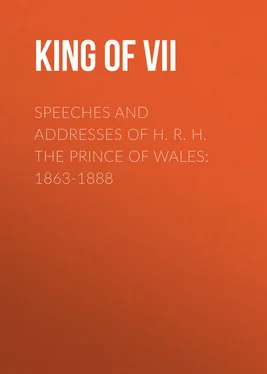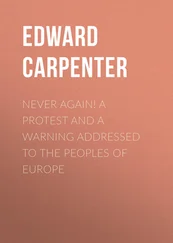Edward VII - Speeches and Addresses of H. R. H. the Prince of Wales - 1863-1888
Здесь есть возможность читать онлайн «Edward VII - Speeches and Addresses of H. R. H. the Prince of Wales - 1863-1888» — ознакомительный отрывок электронной книги совершенно бесплатно, а после прочтения отрывка купить полную версию. В некоторых случаях можно слушать аудио, скачать через торрент в формате fb2 и присутствует краткое содержание. Жанр: История, История, foreign_antique, foreign_prose, на английском языке. Описание произведения, (предисловие) а так же отзывы посетителей доступны на портале библиотеки ЛибКат.
- Название:Speeches and Addresses of H. R. H. the Prince of Wales: 1863-1888
- Автор:
- Жанр:
- Год:неизвестен
- ISBN:нет данных
- Рейтинг книги:3 / 5. Голосов: 1
-
Избранное:Добавить в избранное
- Отзывы:
-
Ваша оценка:
- 60
- 1
- 2
- 3
- 4
- 5
Speeches and Addresses of H. R. H. the Prince of Wales: 1863-1888: краткое содержание, описание и аннотация
Предлагаем к чтению аннотацию, описание, краткое содержание или предисловие (зависит от того, что написал сам автор книги «Speeches and Addresses of H. R. H. the Prince of Wales: 1863-1888»). Если вы не нашли необходимую информацию о книге — напишите в комментариях, мы постараемся отыскать её.
Speeches and Addresses of H. R. H. the Prince of Wales: 1863-1888 — читать онлайн ознакомительный отрывок
Ниже представлен текст книги, разбитый по страницам. Система сохранения места последней прочитанной страницы, позволяет с удобством читать онлайн бесплатно книгу «Speeches and Addresses of H. R. H. the Prince of Wales: 1863-1888», без необходимости каждый раз заново искать на чём Вы остановились. Поставьте закладку, и сможете в любой момент перейти на страницу, на которой закончили чтение.
Интервал:
Закладка:
"The first toast I have the honour to propose is 'The health of Her Majesty the Queen, our munificent Patron;' a toast which I feel sure will be drunk with the enthusiasm which it elicits on all public occasions. Although the Queen is now compelled, to a certain extent, to withdraw from public life, still her interest in every institution of this country, and particularly in charitable institutions, remains undiminished. Gentlemen, I give you 'The Queen.'"
The next toast was proposed by the Marquis of Salisbury, "The health of Her Royal Highness the Princess of Wales, and the rest of the Royal Family." The toast was drunk with all the honours and responded to by His Royal Highness the Chairman. "The Church" having been proposed by the Rt. Hon. Edward Cardwell, and responded to by the Archbishop of Armagh, H.R.H. the Chairman proposed the toast of "The Army, Navy, and Volunteers," saying: —
"This is a toast which it gives me especial pleasure to propose from the circumstance of my having served for a time with both infantry and cavalry. Short as my service was, it has been long enough to impress me with the conviction of the efficiency of all ranks composing the British army. I have also had an opportunity during my voyage to America in 1860, and on many other occasions, of witnessing the able manner in which the duties of the navy are performed. The volunteers demand our warmest thanks and approbation for the zeal with which they came forward when they thought their services were required, a zeal which they still evince on every occasion afforded to them. I beg to couple with 'the Army and Volunteers,' the name of my illustrious relative the Duke of Cambridge, who so ably fills the arduous post of Commander-in-Chief entrusted to him by the Queen, and to whose practical and liberal administration the army owes its present high state of efficiency. With 'the Navy,' I will couple the name of Rear-Admiral Sir Alexander Milne, who has only lately returned from the successful discharge of the difficult duties attaching to the command of the North American Station. Gentlemen, let us drink to the 'Army, Navy, and Volunteers.'"
The Duke of Cambridge and Admiral Sir Alexander Milne having responded, His Royal Highness the Chairman then gave the toast of "The Royal Literary Fund," saying: —
"Your Royal Highness, my Lords, and Gentlemen, I have now the honour to propose the most important toast of the evening, it is 'Prosperity to the Royal Literary Fund.' Although the most important, it is nevertheless the toast upon which, perhaps, I can say least, certainly I can give you no new information, as every one here present knows better than I do the character of this institution. Still it is right that I should offer a few remarks on the working of this Society. You are all aware, gentlemen, of the immense advantages which have been derived from it in support of literature and science. One of its principal features is that it is not limited to our own countrymen, but is often extended to literary men of all nations; so that we may feel proud to think that by our timely assistance, we not only advance the literature of our own country, but that of other nations. In this way, many eminent men who would otherwise be incapacitated from carrying on their labours, and from making their talents known to the world, are enabled to do so. The second important feature is the secrecy with which this timely aid is given, – a secrecy so sacredly observed that in the whole number of cases, which amount to 1,645 since the foundation of this Corporation in the year 1790, there is not a single case of any indiscretion having been committed; and if cases have been brought to light at all, it has only been through the acknowledgment of the literary men thus assisted, who have been anxious to express their gratitude. I ought here to mention the name of an eminent man of letters, whose loss must be deeply deplored in all literary circles. I allude to Mr. Thackeray. I allude to him, not so much on account of his works, for they are standard works, but because he was an active member of your committee, and always ready to open his purse for the relief of literary men struggling with difficulties.
"Gentlemen, some of those here present do not perhaps know that in France, since 1857, an Institution similar to ours, and founded by M. Thenard, has been in existence for the benefit of scientific men only, and that a few days ago M. Champfleury, a distinguished writer, proposed to form a Literary Society adopting some of our principles. It is to be hoped that some day these two societies may form sister Literary Funds; and if administered on our model, I think we may augur for the new institution a large measure of success. We shall at all times be most happy to enter into communication with it, and show it the result of our long experience and of the unwearied zeal and exertion of the Officers of this Corporation.
"I will not detain you much longer, gentlemen, but I cannot sit down without bringing back to your recollection the deep interest which my dear and lamented father took in everything connected with literature and science, and particularly in the labours of this Society. Nobody has forgotten that the second time he spoke in public in this country, was as chairman of the Literary Fund dinner. And we all, I am convinced, deeply regret that the speeches made on that occasion were not reported at full length, as every word falling from those lips could not fail to command universal admiration. Gentlemen, let us drink 'Prosperity to the Royal Literary Fund.'"
The list of subscriptions and donations having been read, including a donation of £110 from the Prince of Wales, Earl Stanhope, as President of the Institution, responded. Speeches being delivered by Earl Russell, Mr. Anthony Trollope, Lord Houghton, and H. E. M. Van de Weyer, Earl Stanhope proposed the health of the Chairman, which was received with much enthusiasm, and the Prince thus replied: —
"Your Royal Highness, my Lords and Gentlemen, I thank you most sincerely for the kind and cordial manner in which you have drunk my health, and I feel proud to have occupied the chair for the first time, on so interesting and important an occasion. I must now take the opportunity to congratulate this Corporation on the great advantage which it enjoys, in the services of the distinguished nobleman who now fills the high office of your President, and who has contributed so much to historical literature. I can give him no higher praise, than by saying that he is a worthy successor of a nobleman who was for more than twenty years your president; who throughout a long political career never made an enemy, and who always found time to assist in the advancement of literature and art. I allude to the late Marquess of Lansdowne. Gentlemen, allow me to propose one more toast. In the presence of a Society, accustomed to cultivate with such signal success the flowers of literature, it would be unpardonable to forget the flowers of society. I propose the health of 'The Ladies,' who, by their numerous attendance here this evening, evince the interest they take in the Literary Fund."
The toast was received with the usual honours. It should have been mentioned that nearly 400 ladies were present, but in the galleries, not at the tables as guests, as is the better custom at some anniversaries.
IRISH INTERNATIONAL EXHIBITION OF 1865
The city of Dublin has seldom presented a scene of more general joy than when the Prince of Wales opened the International Exhibition, on the 9th of May, 1865. The weather was superb, the loyal demonstrations in the streets were enthusiastic, and the great Hall where the opening ceremony took place, decorated with the flag of all nations, was densely crowded with the most distinguished assembly that Ireland could bring to welcome the heir of the throne, and the representative of the Queen. There were no disloyal feelings nor discordant sounds in the Palace that day. The Duke of Leinster, the Earl of Rosse, and the highest and most distinguished of the nobles of Ireland were there. The Lord Mayor and Corporation of the City appeared in their civic robes. The Mayors of Cork and Waterford and Londonderry walked together; and the Lord Mayors of London and York, and the Lord Provost of Edinburgh, with many official personages, joined in the procession. When His Royal Highness took his place in the chair of State, the orchestra, 1000 strong, performed the National Anthem, and 10,000 voices sent up their loyal cheers at its conclusion.
Читать дальшеИнтервал:
Закладка:
Похожие книги на «Speeches and Addresses of H. R. H. the Prince of Wales: 1863-1888»
Представляем Вашему вниманию похожие книги на «Speeches and Addresses of H. R. H. the Prince of Wales: 1863-1888» списком для выбора. Мы отобрали схожую по названию и смыслу литературу в надежде предоставить читателям больше вариантов отыскать новые, интересные, ещё непрочитанные произведения.
Обсуждение, отзывы о книге «Speeches and Addresses of H. R. H. the Prince of Wales: 1863-1888» и просто собственные мнения читателей. Оставьте ваши комментарии, напишите, что Вы думаете о произведении, его смысле или главных героях. Укажите что конкретно понравилось, а что нет, и почему Вы так считаете.












